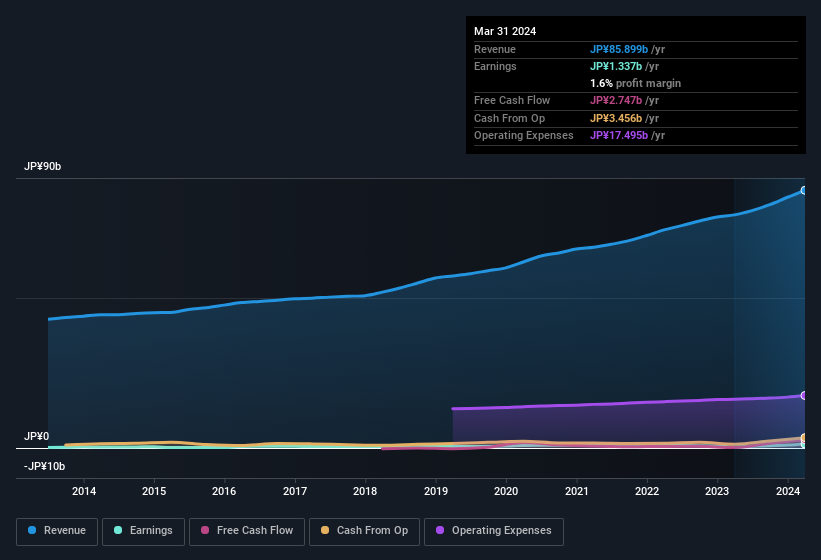- Japan
- /
- Food and Staples Retail
- /
- TSE:3096
Statutory Profit Doesn't Reflect How Good Ocean System's (TSE:3096) Earnings Are
Ocean System Corporation's (TSE:3096) earnings announcement last week was disappointing for investors, despite the decent profit numbers. We have done some analysis and have found some comforting factors beneath the profit numbers.
Check out our latest analysis for Ocean System

A Closer Look At Ocean System's Earnings
As finance nerds would already know, the accrual ratio from cashflow is a key measure for assessing how well a company's free cash flow (FCF) matches its profit. In plain english, this ratio subtracts FCF from net profit, and divides that number by the company's average operating assets over that period. You could think of the accrual ratio from cashflow as the 'non-FCF profit ratio'.
Therefore, it's actually considered a good thing when a company has a negative accrual ratio, but a bad thing if its accrual ratio is positive. While it's not a problem to have a positive accrual ratio, indicating a certain level of non-cash profits, a high accrual ratio is arguably a bad thing, because it indicates paper profits are not matched by cash flow. To quote a 2014 paper by Lewellen and Resutek, "firms with higher accruals tend to be less profitable in the future".
Over the twelve months to March 2024, Ocean System recorded an accrual ratio of -0.15. That indicates that its free cash flow quite significantly exceeded its statutory profit. To wit, it produced free cash flow of JP¥2.7b during the period, dwarfing its reported profit of JP¥1.34b. Ocean System's free cash flow improved over the last year, which is generally good to see.
Note: we always recommend investors check balance sheet strength. Click here to be taken to our balance sheet analysis of Ocean System.
Our Take On Ocean System's Profit Performance
Ocean System's accrual ratio is solid, and indicates strong free cash flow, as we discussed, above. Based on this observation, we consider it likely that Ocean System's statutory profit actually understates its earnings potential! And on top of that, its earnings per share have grown at an extremely impressive rate over the last year. The goal of this article has been to assess how well we can rely on the statutory earnings to reflect the company's potential, but there is plenty more to consider. If you'd like to know more about Ocean System as a business, it's important to be aware of any risks it's facing. Case in point: We've spotted 1 warning sign for Ocean System you should be aware of.
Today we've zoomed in on a single data point to better understand the nature of Ocean System's profit. But there are plenty of other ways to inform your opinion of a company. For example, many people consider a high return on equity as an indication of favorable business economics, while others like to 'follow the money' and search out stocks that insiders are buying. While it might take a little research on your behalf, you may find this free collection of companies boasting high return on equity, or this list of stocks with significant insider holdings to be useful.
New: AI Stock Screener & Alerts
Our new AI Stock Screener scans the market every day to uncover opportunities.
• Dividend Powerhouses (3%+ Yield)
• Undervalued Small Caps with Insider Buying
• High growth Tech and AI Companies
Or build your own from over 50 metrics.
Have feedback on this article? Concerned about the content? Get in touch with us directly. Alternatively, email editorial-team (at) simplywallst.com.
This article by Simply Wall St is general in nature. We provide commentary based on historical data and analyst forecasts only using an unbiased methodology and our articles are not intended to be financial advice. It does not constitute a recommendation to buy or sell any stock, and does not take account of your objectives, or your financial situation. We aim to bring you long-term focused analysis driven by fundamental data. Note that our analysis may not factor in the latest price-sensitive company announcements or qualitative material. Simply Wall St has no position in any stocks mentioned.
About TSE:3096
Ocean System
Engages in the supermarket, lunch service, food delivery, and inns and other businesses in Japan.
Flawless balance sheet average dividend payer.
Market Insights
Community Narratives


Recently Updated Narratives

Proximus: The State-Backed Backup Plan with 7% Gross Yield and 15% Currency Upside.

CEO: We are winners in the long term in the AI world

Early mover in a fast growing industry. Likely to experience share price volatility as they scale
Popular Narratives


MicroVision will explode future revenue by 380.37% with a vision towards success


The company that turned a verb into a global necessity and basically runs the modern internet, digital ads, smartphones, maps, and AI.



